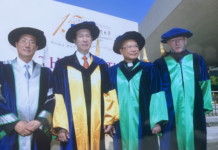From the organizers:
Conference context
Launched in 2003, the Canadian e-Learning Conference has developed into an engaging venue for practitioners, instructors, administrators, and students alike to share ideas and evidence on technology enhanced learning and teaching. In 2010, in keeping with our conference theme of “rEvolution,” the conference comes full circle and returns to its origins at the University of Alberta.
In choosing the word rEvolution to guide and define this year’s conference, we hope to inspire thinking on a number of fronts: on the one hand, revolution is a marker of radical change, progress, and new and innovative thinking; on the other, revolution speaks to the cyclical nature of time and progress, where a full revolution (of a wheel, even of the globe) brings us back to where we began. Contained within “revolution”, and perhaps in contrast to the sense of radical and fast-paced change, we find “evolution” which helps us to recognize that change can happen incrementally and at a much more guarded and methodical pace. Each of these connotations gives us fruitful ways to think through the relationships between and among teaching, learning, discovery, and technology.
Submit a proposal
We invite you to submit a proposal to the 2010 conference program. Like e-Learning tools, the program is flexible and allows for innovation. Proposals must specify one of the conference formats listed below, and are encouraged to engage with one of the key conference themes.
Conference Themes
Imagine the Possibilities
These presentations will focus on the near and distant futures of e-Learning. What will e-Learning be like in 20 years? Tomorrow?
Reality Check
How feasible is innovation in e-Learning? What are the impacts of current fiscal, administrative, political and educational realities on the implementation of e-Learning? These sessions should be rooted in current realities and, where possible, based on evidence-based practice.
Keeping Our Feet on the Ground
“Teaching is teaching.” How should the scholarship of teaching drive developments in e-Learning? What is the empirical evidence?
We’re Listening
We strongly encourage student presenters to share how they understand, critique, and analyse their relationship to e-Learning.
Case Studies and Demonstrations
These sessions highlight specific experiences with e-Learning : specific assignments, courses, or innovations. We particularly encourage submissions under the headings “My best failure” and “My greatest success.”
Conference Formats
- Presentations (20 minutes) may consider any interesting topic. These will be more standard 15 minute presentations followed by 5 minutes of questions and discussion, grouped according to topic. We welcome proposals for individual papers as well as for full panels.
- Seminars (60 minutes) are a new format this year. The seminar leader will post a paper or series of papers for participants to read before the conference. The seminar leader will then pose questions for the participants to discuss during the seminar.
- Lightening talks (5 minutes) are 5 minute, 5 slide presentations, an ideal format for highlighting one interesting idea without the usual context and argument that would accompany a conventional paper. Lightening talks will be grouped into sessions and participants and presenters will have an opportunity to discuss the ideas presented at lightning speed.
- Panel discussions (45 minutes) consist of a panel of multiple speakers, each offering a perspective on an issue or set of issues, with time for questions and discussion.
- Poster presentations offer the opportunity to share and examine problems, issues, and solutions in an informal, interactive environment. The poster presentation will also provide time for networking and socializing.
- Hands-on Technology Workshops (2 hours), offered during the conference, workshops create a hands-on learning space for participants and allow them to put e-Learning tools and pedagogy into action.
- Opportunities for Non-Presenters
Discussion Tables (lunch) provide an opportunity for networking and collaborating on an idea or issue over lunch. - Open Room (10 minutes plus unlimited discussion), another new format this year, provides an innovative opportunity to discuss eureka ideas – a kind of Commons or soapbox for everyone. Conference participants will submit their proposals on site to the convener who will schedule the presentations in the Open Room as soon as possible. Once scheduled, Open Room presenters will be limited to 10 minutes. Presenters from other streams are also encouraged to make use of this room to continue discussions from their submitted presentations or to build interest in upcoming presentations.
Questions? celc2010@ualberta.ca











 Dr. Tony Bates is the author of eleven books in the field of online learning and distance education. He has provided consulting services specializing in training in the planning and management of online learning and distance education, working with over 40 organizations in 25 countries. Tony is a Research Associate with Contact North | Contact Nord, Ontario’s Distance Education & Training Network.
Dr. Tony Bates is the author of eleven books in the field of online learning and distance education. He has provided consulting services specializing in training in the planning and management of online learning and distance education, working with over 40 organizations in 25 countries. Tony is a Research Associate with Contact North | Contact Nord, Ontario’s Distance Education & Training Network.


Today, learning is fast forward, moved to a new dimension. It’s early, allowing a unique curriculum tailored to each student’s ability, skills and interests. Learning is not the only thought that takes place online, you can also check online grammar automatically with a few clicks will give you an instant correction of your essay or article.